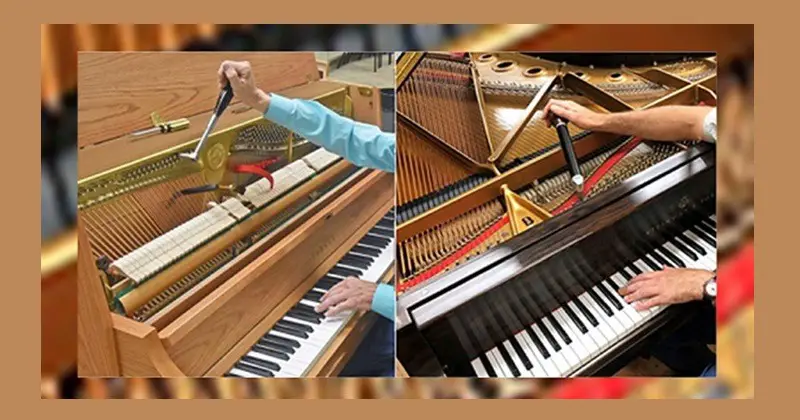
Experienced piano tuner / technicians reveal their experience and secrets.
Piano technician Michael Blackwell from New York
Piano technician Michael Blackwell shares what it takes to be a master Piano tuner.
Michael Blackwell, a native of upstate New York, has been tuning pianos for the last few decades, and has been associated with the Santa Fe Chamber Music Festival (keeps their pianos tuned and well regulated) for a very long time. He was more of a novice as a piano technician when he moved to Santa Fe, but now has been associated with the festival for years.
“I start a week before the festival begins, and then I tune and adjust instruments every day a piano is played in a concert — and sometimes there are two concerts in a day, maybe a recording session. I tune for concerts at the St. Francis Auditorium and the Lensic, and also for off-site concerts. I tune for rehearsals, and I tune other pianos the artists may be using during their stay here,” says Michael Blackwell.
How did he he started as a piano tuner?
It was all a coincidence says Blackwell, and everything happened in the span of a couple of weeks.
First, he say a blind piano technician repairing the piano at the piano-tuning department of a school for blind students, and was intrigued by the process. Within two weeks, he learnt that one of his friends was graduating from piano technician school. And then another friend told hie that he was going to study piano tuning, and Michael accompanied him to a place called Tuner’s Supply, which sold hammers, strings, and all kinds of piano parts.
All these instances convinced him to learn the art (Blackwell himself was very keen to learn the trade).
Having made up his mind, Michael Blackwell enrolled at the North Bennet Street School, a trade school in Boston, to study to be a piano technician. The course was ten months, and he was very happy with the skills that he learnt at the school.
The Chamber Music Festival rents its pianos out of Albuquerque, and they are very clear about what can be altered in the pianos.
“They want minimal involvement — especially with needles,” said Blackwell, meaning he would not be allowed to prick at the felt on the piano’s hammers to change its voicing and, by extension, its basic tone.
So what sort of environment he needs to tune the piano, considering that the venue of a music festival is not very quite?
“They have an appreciation for what I needed: dead silence, no ushers stuffing programs. I needed to be alone in the hall so I could hear the subtle things.” Blackwell sits listening intently through every concert, and sometimes he returns to the stage during intermission for a touch-up. “It’s noisy at intermission but you already know your targets, roughly, so you know what you have to do to adjust that last bit.”
So has he ever got tired of tuning these pianos? After all they have the same 88 keys?
Not at all! Blackwell says every piano has its own fingerprint, individualized to that piano, and so not all the 88-note keyboards are the same.
“While getting the pitch right relates to the part of the string that extends between pins that cut off the vibration near the front and back, the bits of the strings that anchor to the piano beyond those points are not inconsequential.”
So does it require special skills to be a piano technician? (many refer to his ministrations as magical).
“Everything in the piano is connected to the structure. Everything about the structure contributes to how this piano is working or not working. There’s no magic,” says Blackwell.
William Bolerjack: Tuning pianos for 4 Decades
William Bolerjack has been tuning pianos and doing repairs for the past 40 years.
With his tuning hammer, wedge and other tools required for tuning the piano, Bolerjack says he’s tuned and repaired 4,000 to 5,000 pianos in Arizona and Illinois.
Bolerjack started playing the piano at age 4, and eventually graduated from the University of Arizona in music. He plays piano, trumpet, French horn and percussion instruments.
Here are some nuggets that he shared on tuning a pianoo:
- Tuning the piano takes about 40 minutes – to get an accurate pitch. “It takes time. You can’t do this by computer. Pianos need to be primed and tuned. I do it by ear and also use an electronic tuner”.
- He has tuned every size and shape piano — grand pianos, baby grands, spinets and player pianos. He said every piano is a little different. “You tune them the same way, whether they’re old or new.”
- A piano is a musical instrument and not a piece of furniture. So keep it tuned, keep it maintained. Don’t buy cheap. Buy quality.
- About the effect of humidity on a piano, Bolerjack said people who own a piano need to follow the humidity. In dry Southern Arizona he suggests having a humidifier or a bowl of water in the room from October until summer when the rains come.
Source: gvnews
Useful Links
Also Read:
- Piano Tuning Guide: Essential maintenance work on acoustic pianos.
- Essential Piano Tuning Tool Kits (Levers, Hammers, Pins & More)
KeytarHQ editorial team includes musicians who write and review products for pianists, keyboardists, guitarists & other musicians. KeytarHQ is the best online resource for information on keyboards, pianos, synths, keytars, guitars and music gear for musicians of all abilities, ages and interests.



Leave a Reply